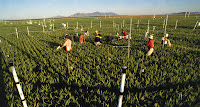A dinner plate piled high with food from plants might not deliver the same nutrition toward the end of this century as it does today. Climate change could shrink the mineral and protein content of wheat, rice and other staple crops, mounting evidence suggests.
Selenium, a trace element essential for human health, already falls short in diets of one in seven people worldwide. Studies link low selenium with such troubles as weak immune systems and cognitive decline. And in severely selenium-starved spots in China, children’s bones don’t grow to normal size or shape. This vital element could become sparser in soils of major agricultural regions as the climate changes, an international research group announced online February 21 in Proceedings of the National Academy of Sciences.
Likewise, zinc and iron deficiencies could grow as micronutrients dwindle in major crops worldwide, Harvard University colleagues Samuel Myers and Peter Huybers and collaborators warned in a paper published online January 6 in the Annual Review of Public Health. Futuristic field experiments on wheat and other major crops predict that more people will slip into nutritional deficits late in this century because of dips in protein content, Myers reported February 16 at the Climate and Health Meeting held in Atlanta.
“If we’d sat down 10 years ago and tried to think what the effects of anthropogenic carbon dioxide emissions might be on human health, none of us would have anticipated that one effect would be to make our food less nutritious,” Myers said. “But we can’t fundamentally disrupt and reconfigure most of the natural systems around our planet without encountering unintended consequences.”
Changing Climate Could Worsen Foods’ Nutrition

No comments:
Post a Comment